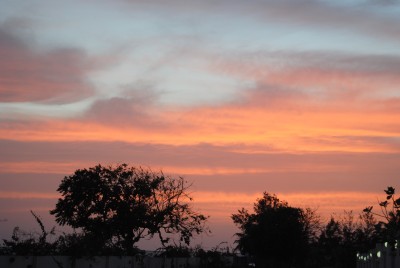LITERARY CORNER – AN EXCERPT FROM “GAMBIAN WEDDING: NOT JUST ANOTHER AFRICAN LOVE STORY” by Jaye W. Saidy
PROLOGUE
A black velvet shroud of darkness descends on the village of Kotu Quarry in the Gambia as I creep into Imam Darboe’s small work room. It is 2008. He is busily lighting two tall white candles in bronze candlesticks as he gently gestures me to sit on a stool in front of him. The grey-bearded man in simple grey cotton attire, sits cross-legged on the ground which is covered by various pieces of cloth and blankets. It is my third and final visit to the elderly marabout’s humble abode, at least that’s what I’ve been told. Things are not always so clear and straightforward in this part of the world, and after five visits to this tiniest of West African nations, I have grown to appreciate this as one of its charms.
Imam Darboe is both an imam and a marabout. Imams are religious guides who are leaders of prayers in the mosque and are often also community leaders. Marabout’s are West African spiritual leaders, often consulted for predicting the future in exchange for payment. They give counsel and provide amulets and jewellery that are believed to bring good luck. Juju is the supernatural power ascribed to these amulets and wielded by spiritual figures in many West African cultures. Some marabouts take on young students of the Koran and Islam. Marabouts have their critics and tales of all sorts weave around them from village to village, not unlike the River Gambia itself.
I went to see Imam Darboe in his capacity as a marabout. He is originally from the village of Niumi Laming, which lies on the north bank of the River Gambia. His family is a religious family which has provided imams for the village for generations. My first visit had been two days earlier with my new friend, the bird guide, Maudo Keita. The imam had spoken in hushed tones, and gazed upon me with kind and caring eyes. I trusted him immediately and was ready to pour out my heart at a moments notice
“Maudo has told me a little about why you are here. You have come about your husband?” he asked gently.
“Yes.” I managed to say through my quickly welling tears. “I don’t wish him any harm, you understand, I just want him to accept that our marriage is over, so I can travel freely in the Gambia once more.”
“Ah, yes, I understand. This is a dangerous situation for you. But please, let me first take a look at your hand so I can see what kind of person you are and what the future holds for you.”
As he grabbed for a flashlight and whacked it a few times so that it would come on, I looked on intently. This juxtaposition of spirituality and the trials of modern technology did not faze any of us present. I realized I’d never consulted a fortune teller or psychic in my life, having been hitherto solidly grounded in the material world. And as he held the flashlight up to my hand and touched it gently in various places, I felt like the ingenuous Dorothy in the Wizard of Oz, as she and Professor Marvel first gaze into his crystal ball just before the tornado strikes Kansas
I was entranced as he revealed several of my personal characteristics and uttered a few dire warnings. I looked at Maudo and exclaimed “It’s all true!” Maudo proudly whispered, “He’s very good!” I nod in complete agreement. The marabout then proceeded to pull out a piece of paper, which he placed on a rough slab of wood balanced on his leg for support, dipped a pen in a small pot of black ink and began to write in the flowing strokes of Arabic. He asked for my full name and my husband’s as well as our places of residence, and wrote them down on this same piece of paper. I had no clue what he was writing in addition to our names, but it certainly looked impressive. My enthusiasm increased with every moment that passed.
The marabout reviewed his handiwork carefully and then concluded this first meeting by pronouncing “We will need a ram’s horn and a vulture feather.” He indicated that he would be happy to obtain these for me. Furthermore, he would ask the local silversmith to craft me a ring. I would also be given a small talisman for protection along with this in two days. Then we negotiated his fee. Maudo had seriously underestimated the cost in our preliminary discussions, but I was happy to pay the toubab or Caucasian price of 950 Gambian dalasis (equivalent to approximately 50 Canadian dollars) for services rendered. There really was no way to put a price on such an experience. As requested, I paid a small deposit so that the silver ring could be ordered and other items purchased. The imam measured my middle finger on my right hand with a string. I left feeling satisfied that I was in good hands.
And so here we were, dutifully returning, two days later on the Friday. We’d arranged a meeting time of 5pm, but as we arrive, Imam Darboe is no where to be found. Fortunately, we see that his two cell phone numbers have been carefully written in large print on the wall of one of the small buildings in the compound, and so we try calling both. (Most Gambians try to keep two cell phones, one for each service provider, Gamcel and Africell. You can never tell which one’s network will be operating best at any given time.) But over and over, the kindly recorded operator tells us that the owner of the mobile phone (using the British term) we’re calling is either turned off or outside the range of the network.
Family members who are gathered around at the front of a strip of rooms in the compound, tell us he had been called across the River Gambia earlier in the day and perhaps is having trouble crossing back on the ferry. We guess that perhaps his phones have used up their electrical charge, or he has run out of his “credit”. A young man sits nearby preparing ataya, a sweet green tea very popular with young and old alike. I always find the process of tea brewing fascinating and comforting. A wrought iron brazier is filled with locally made charcoal, carefully lit and once the coals are glowing, a small enamelled tea pot is filled with water and left to boil atop the heap of coals. Three small shot glasses are prepared and cleaned with the boiling water and placed on an enamelled tray. A package of Chinese gunpowder tea, purchased in a local shop, is placed in the water with lots of sugar. The mixture is left to boil. The tea is poured into the little glasses, and then distributed on the little tray. The tea is boiled three times, the first boil being the most prized. As a guest, I am always offered a drink of the first boiled pot.
I keep looking at my watch and then at Maudo, wondering if we should give up hope of of the imam coming.
He finally arrives. We greet each other and are then welcomed into his work room again. He apologizes for being late and confirms that the ferry had been very busy. Maudo and I sit on low stools across from the imam sitting on the carpet and listen and watch as he lights the candles and pulls out some cloth-wrapped items.
Just as we are deep in concentration, the imam’s phone rings. He has quite the lively pop song as his ring tone and I can’t help smiling to myself. The imam excuses himself and gets up to answer the phone. He speaks excitedly in Mandinka for a bit and then turns off the phone, and returns to his place on the ground, apologizing for the interruption.
I am given my beautiful silver ring – it fits perfectly but I’m surprised by how high it sits, three round quarter inch disks are perched on a wide band. Imam Darboe instructs me to never remove the ring and it will bring me money. He then stands up and pulls out a small somewhat soiled white plastic bottle which he fills with ‘holy water’. I am told to wash my hands with the holy water until it is finished.
Suddenly, his other phone rings from across the room, with yet another jazzy song as its ringtone. I am beginning to accept these interruptions as part of the mystery of it all. He again speaks briefly and excitedly, comes back and apologizes for the interruption. He hands the bottle of holy water to me and I place it carefully beside me. Next he pulls out a small piece of fur with a loop of leather stitched on the top. It is hyena skin and I am told to keep this talisman with me at all times for protection from my husband. I rub it softly and then place it in my purse. Sewn inside this skin is the piece of paper on which our names had been inscribed two days earlier.
The imam hands a vulture feather to Moudo and instructs him to bury it on the beach the next day. “No problem, I will do it on my way for my daily run on the beach early tomorrow.” Moudo promises. Imam Darboe then begins to speak in Arabic, some kind of blessings, I am imagining. We hold out our hands palms up to receive the blessings, then we gently tap our foreheads, as is the custom. I place the remaining fee in the imam’s warm hands and thank him for his help. He escorts us outside and we exchange goodbyes. I feel slightly sad as Moudo and I retreat and look back to give our final wave, having no idea if this man, in fact, possesses magical powers but really not caring, for I am at peace.


